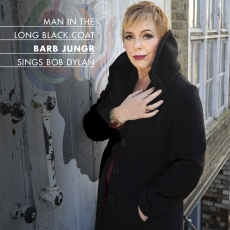Barb Jungr - Man in the Long Black Coat - The Art of the Torch Singer
There are three elders at the top of the tree when it comes to British female singers who have an instinctive ability to tell the whole story in a song: Norma Waterson, June Tabor and Barb Jungr. Forget any ungallant connotations. I use the word simply to connote wisdom and an almost forensic approach to their craft. If Waterson is the benevolent earth mother, Tabor is the cool, all-seeing and often bleak eye at the centre of life's storm. Jungr, on the other hand, hurls herself into the maelstrom, seeking the key to the most visceral experiences in the songs and chansons of the great modern songwriters and rendering them into compelling dramas for the listener.
This summer saw the simultaneous release of two albums from Jungr. Strictly speaking, neither is actually ‘new'. Man in the Long Black Coat is a compilation of Bob Dylan recordings made since her groundbreaking 2002 set, Every Grain of Sand, with the bonus of four additional songs laid down in the studio at the start of this year. Durga Rising is the reissue of her 1997 collaboration with renowned Asian music producer Kuljit Bhamra and Jungr's late, and much-missed, accompanist Russell Churney. Between them, these very different pieces of work showcase an unstinting commitment to innovation and exploration that runs like seams of resilient, glistening black jet through her finest interpretations. Why this important British singer is still waiting to make an appearance on Later... with Jools Holland is a mystery.
Some people have hailed Man in the Long Black Coat as Jungr's best album yet. And there is certainly a holistic feel to the album; much of this possibly comes from the sense of a ‘journey', in which Jungr is getting closer and closer to crystallising exactly what Dylan's lyrics mean to her. In doing so, she becomes increasingly agile with the possibilities and nuances that they offer.
The four most recent tracks - the title track with its ominous, funereal bell, "It Ain't Me Babe", the bitter, ironic "With God on Our Side", and the sublime "Sara" - were all arranged and recorded with pianist Jenny Carr. They reveal a singer at her peak, brimming with confidence in the material. Dylan purists will no doubt perceive liberties being taken. Let them get on with it. There's an audacity and boldness about these reinvented classics that is rooted in Jungr's sense of freedom in the world she discovers through them.
From the up tempo "The Times They Are A-Changin'" to the reggae beat of "Just Like a Woman", a spacey treatment of "Like a Rolling Stone" and the bluesy "High Water", Jungr pursues the truth in the lyrics with a spirit of adventure and a musicality that is always intriguing. Who else could dream of giving "Blind Willie McTell" the feel of a chanson and make it work with such flair?
"Willie McTell" also turns up in a different, more subdued version on Durga Rising. This album, sub-titled ‘An Indo-Jazz Adventure' is a cornucopia of human experience; bhangra beats meet midnight soul. Jungr and Bhamra have taken it on the road recently, now with exemplary pianist Simon Wallace, to great acclaim.
Jungr's natural territory is pain and darkness, but she can also spin tails of dizzying happiness. Both extremes are here in a collection of almost entirely self-penned lyrics (Dylan aside), and the music of Bhamra, Churney and her old partner-in-song Michael Parker.
Bhamra's percussion is ethereal and fleet-fingered, working with Jungr's vocals in contrapuntal sequences that shimmer with energy. When things get dark, they get really dark. "How Could I Ever", "Tears in a Bottle" and the lascerating, end-of-the-affair piece of advice, "Choose to be Alone", offer delicious degrees of cynicism. So do the apocalyptic overtones of "Crimes Against Nature". But there are plenty of lighter textures in the music, and the exhilarating, life affirming romance of "Bombay Dreaming" - a latin-ish, retro dance hall number - is balm for the most jaded spirit.

